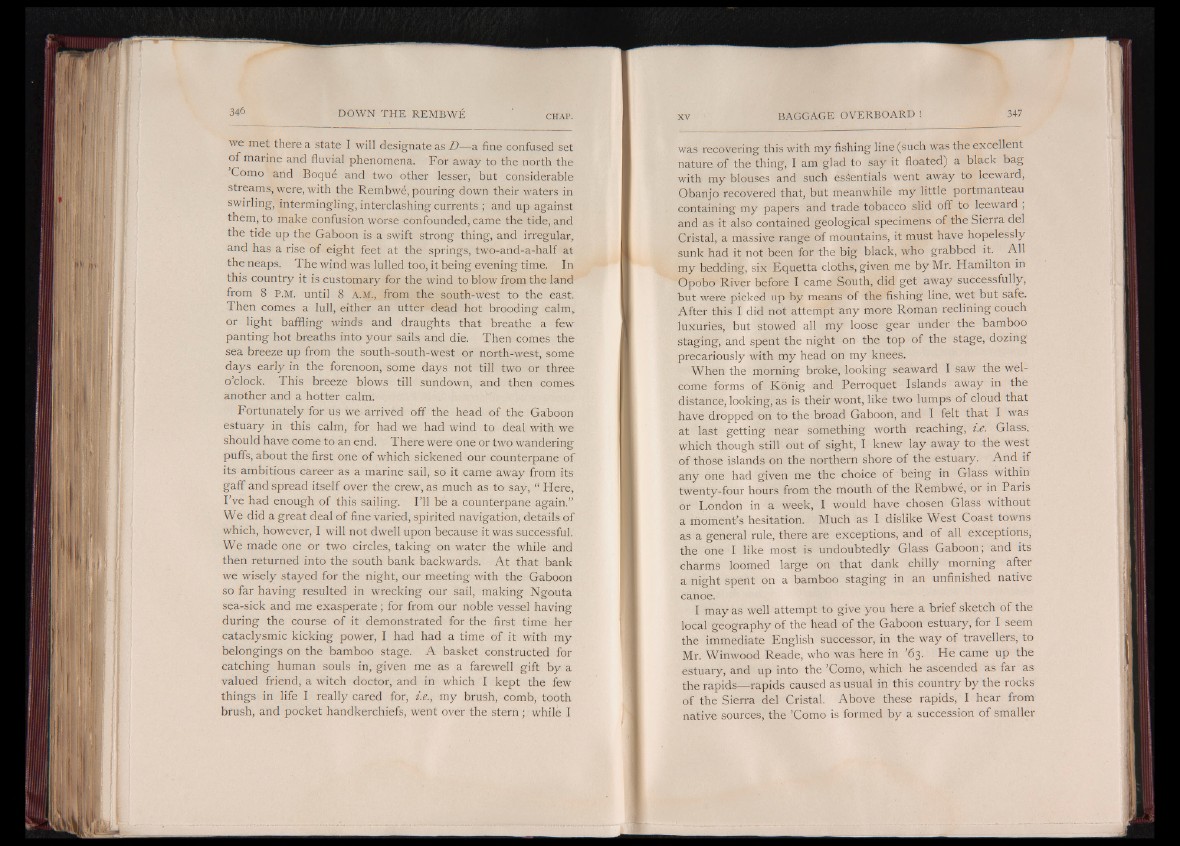
we met there a state I will designate as D— a fine confused set
of marine and fluvial phenomena. For away to the north the
Como arid Boqu£ and two other lesser, but considerable
streams, were, with the Rembwe, pouring down their waters in
swirling, intermingling, interclashing currents ; and up against
them, to make confusion worse confounded, came the tide, and
the tide up the Gaboon is a swift strong thing, and irregular,
and has a rise of eight feet at the springs, two-and-a-half at
the neaps. The wind was lulled too, it being evening time. In
this country it is customary for the wind to blow from the land
from 8 P.M. until 8 A.M., from the south-west to the east.
Then comes a lull, either an utter dead hot brooding calm,
or light baffling winds and draughts that breathe a few
panting hot breaths into your sails and die. Then comes the
sea breeze up from the south-south-west or north-west, some
days early in the forenoon, some days not till two or three
o’clock. This breeze blows till sundown, and then comes
another and a hotter calm.
Fortunately for us we arrived off the head of the Gaboon
estuary in this calm, for had we had wind to deal with we
should have come to an end. There were one or two wandering
puffs, about the first one of which sickened our counterpane of
its ambitious career as a marine sail, so it came away from its
gaff and spread itself over the crew, as much as to say, “ Here,
I’ve had enough of this sailing. I’ll be a counterpane again.”
We did a great deal of fine varied, spirited navigation, details of
which, however, I will not dwell upon because it was successful.
We made one or two circles, taking on water the while and
then returned into the south bank backwards. A t that bank
we wisely stayed for the night, our meeting with the Gaboon
so far having resulted in wrecking our sail, making Ngouta
sea-sick and me exasperate ; for from our noble vessel having
during the course of it demonstrated for the first time her
cataclysmic kicking power, I had had a time of it with my
belongings on the bamboo stage. A basket constructed for
catching human souls in, given me as a farewell gift by a
valued friend, a witch doctor, and in which I kept the few
things in life I really cared for, i.e., my brush, comb, tooth
brush, and pocket handkerchiefs, went over the stern ; while I
was recovering this with my fishing line (such was the excellent
nature of the thing, I am glad to say it floated) a black bag
with my blouses and such essentials went away to leeward,
Obanjo recovered that, but meanwhile my little portmanteau
containing my papers and trade tobacco slid off to leeward ,
and as it also contained geological specimens of the Sierra del
Cristal, a massive range of mountains, it must have hopelessly
sunk had it not been for the big black, who grabbed it. All
my bedding, six Equetta cloths, given me by Mr. Hamilton in
Opobo River before I came South, did get away successfully,
but were picked up by means of the fishing line, wet but safe.
After this I did not attempt any more Roman reclining couch
luxuries, but stowed all my loose gear under the bamboo
staging, and spent the night on the top of the stage, dozing
precariously with my head on my knees.
When the morning broke, looking seaward I saw the welcome
forms of König and Perroquet Islands away in the
distance, looking, as is their wont, like two lumps of cloud that
have dropped on to the broad Gaboon, and I felt that I was
at last getting near something worth reaching, i.e. Glass,
which though still out of sight, I knew lay away to the west
of those islands on the northern shore of the estuary. And if
any one had given me the choice of being in Glass within
twenty-four hours from the mouth of the Rembwe, or in Paris
or London in a week, I would have chosen Glass without
a rhoment’s hesitation. Much as I dislike West Coast towns
as a general rule, there are exceptions, and of all exceptions,
the one I like most is undoubtedly Glass Gaboon; and its
charms loomed large on that dank chilly morning after
a night spent on a bamboo staging in an unfinished native
canoe.
I may as well attempt to give you here a brief sketch of the
local geography of the head of the Ga.boon estuary, for I seem
the immediate English successor, in the way of travellers, to
Mr. Winwood Reade, who was here in ’63. He came up the
estuary, and up into the ’Como, which he ascended as far as
the rapids— rapids caused as usual in this country by the rocks
of the Sierra del Cristal. Above these rapids, I hear from
native sources, the ’Como is formed by a succession of smaller